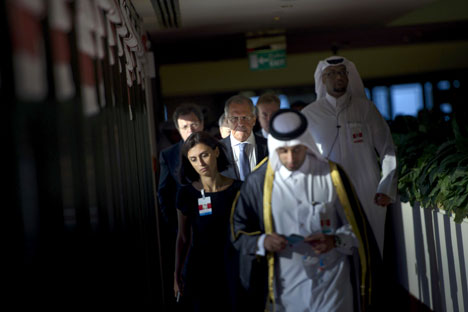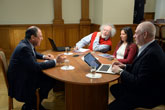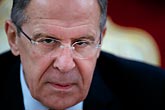“Putin's plan” to deal with ISIS

Russia's Foreign Minister Sergey Lavrov (C) walks with others before a trilateral meeting in Doha, Qatar August 3, 2015. Source: Reuters
Russia’s Foreign Minister Sergey Lavrov disclosed details of the Russian plan to combat the ISIS at a meeting in Qatar’s capital on August 3. The plan was first suggested by Russian President Vladimir Putin in June. The proposal aims to combine efforts of the Syrian and Iraqi armies, Kurdish militias and other regional forces against ISIS. However, the major hurdle here is the question of the Syrian President Bashar al-Assad’s regime, which the United States and several Gulf States want to have removed from power.
In Doha, Lavrov said Moscow feels that “only air strikes (conducted against ISIS by US-led coalition forces) is insufficient”, and “it is necessary to form a coalition of like-minded people”, including from those who are “on the ground with weapons in hand fighting against this terrorist threat”. “And that includes the Syrian and Iraqi armies and the Kurds,” said Lavrov. According to a Russian Foreign Ministry statement, the coalition against ISIS must be formed on “a coherent international legal basis”, which means only with a UN Security Council mandate.
The minister said the question of Russia’s support for Assad is irrelevant to now, as not too long ago, during meetings held in Geneva on the Syrian crisis, “the international community, including members of the UN Security Council, Turkey, the EU, and the Arab countries, agreed to a transitional political period, and not to a regime change in Syria...”.
No reaction
It is unclear how US Secretary of State John Kerry and Saudi Foreign Minister Adel al-Jubeir reacted to the Russian proposal. According to Yevgeny Satanovsky, president of the Institute of the Middle East, an independent research center, this was something that everyone expected from such a meeting – given the current international environment. The Americans are on a course that refuses to change the USA’s attitude towards the Assad regime, making it extremely difficult to implement the Russian plan. He said Washington “received an order to overthrow Assad” and “one of these ‘customers’ is Saudi Arabia”. According to Satanovsky, given this background, a breakthrough in the Syrian direction is unlikely.
The analyst believes that even a growing threat from ISIS will not impact the USA’s approach to the ruling regime in Syria, since activities of ISIS do not directly threaten US interests.
Help to “moderate” Syrian opposition
Despite appeals from Moscow on August 3, Washington is apparently toughening its position against the Assad regime. The United States now plans to militarily defend the “moderate” Syrian opposition, which the USA has trained, in the event of attacks on them not only by ISIS militants, but also by the Syrian Army.
As the Pentagon announced, “defensive fire support” was provided on Friday. The targets of this “support” were militants linked to the Al Qaeda extremist organization – the Jabhat al-Nusra Front. The Pentagon said this “fire support” from the air would be provided “regardless of who attacks them, (militants of the “moderate” Syrian opposition) or who they attack”.
In Doha, Lavrov called this approach illegal, from the point of view of international law, stressing that it constitutes an obstacle to the formation of a united front to counter ISIS. He also noted that “the most important thing here is that, so far, as events have proven, the vast majority of the so-called ‘moderate’ opposition militants, trained in neighboring countries by American military instructors, have ended up fighting on the side of the extremists”. “I do not think I was able to shake the US position, but we clearly disagree on this issue,” the Russian minister concluded.
All rights reserved by Rossiyskaya Gazeta.
Subscribe
to our newsletter!
Get the week's best stories straight to your inbox

